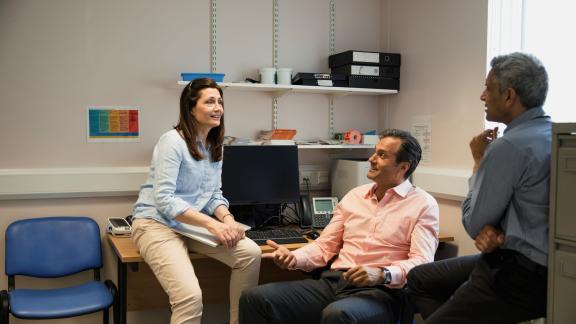At-scale primary care: a win-win for GPs and systems

Professor Aruna Garcea calls on primary care colleagues to see the bigger picture and consider capacity creation in the long term and as a whole system.
Earlier in the month we published our report, Primary Care Networks: Three Years On, which took stock of the first three tumultuous yet extremely fruitful years of primary care networks (PCNs). Given the events in recent history and the challenges facing the NHS, it’s easy to lose sight of what primary care has achieved within this period and how working beyond the traditional practice walls has enabled it. And, when we consider how general practice appointments are increasing, I can’t help but wonder what PCNs’ role and that of long standing federations has been in this, and what further system-wide benefits of primary care at scale are yet to be realised.
We’ve come a long way
When PCNs were launched in 2019, nobody could have predicted what was around the corner. Within a matter of months COVID-19 had accelerated collaboration, with GP practices working together to set up hot and cold hubs. Then, within a year, PCNs and federations were leading the vaccination effort; an accolade they maintain to this day. New services that aim to tackle health inequalities and aid long-term prevention have also been introduced, including annual physical health checks for those on the learning and disability register, and working with our community colleagues to provide Enhanced Health in Care Homes.
Through working as multi-disciplinary teams with our mental health and community colleagues we are more agile and efficient
With these services it simply makes sense to collaborate, both for the NHS and for patients. Through working as multi-disciplinary teams with our mental health and community colleagues we are more agile and efficient, whilst also improving outcomes for our patients and helping them to improve their health and quality of life through getting the right care. The knock-on effect of this is more time for us as GPs to do what we do best and deliver direct care at the heart of the communities we serve.
We all know that demand to see a GP is high and, with caring for patients whilst they wait for treatment elsewhere in the NHS also taking up our time, we must work as efficiently as possible. This is what working together as PCNs enables us to do: pool resources, work more efficiently to increase capacity and provide more appointments, and (if we’re lucky) to focus on upstream prevention. And as October’s GP appointment figures demonstrate, we’re starting to see results and were doing so even before Enhanced Access Service was included.
At-scale models and the wider NHS
At-scale models clearly add value to primary care, but how do they add to the wider NHS, and indeed systems?
Well, the answer to this is simple: they already do, and have done in the past. Take the vaccination programme, for example. PCNs accounted for 71 per cent of all vaccinations, despite not being the only providers able to administer vaccines and being expected to be part of a mixed delivery model within systems. (I've mentioned federations already and I make no apologies for doing so again, that figure of 71 per cent can be attributed in many cases to the infrastructure provided by federations). This and other immunisation and screening programmes are preventative public health measures that, ultimately, increase capacity in the long-term. There are also examples of primary care at scale helping with short-term capacity creation through out-of-hours and minor injury clinics.
We are temporary guardians of our NHS and I want to hand a sustainable future to the following generations
Here, I think the issue is that the dots simply aren’t being joined. We – because integrated care systems include all of us – are not thinking about capacity creation in the long term and as a whole system. I am not pointing the finger at anyone, we are in the midst of significant system transformation, grappling our way out of a pandemic and under enormous and immediate demand pressures. The capacity to think long term is minimal. However, it is not optional. We are temporary guardians of our NHS and I want to hand a sustainable future to the following generations.
But it is not about ‘I’ or anything else singular, the COVID-19 vaccination programme, for example, is considered something that ‘primary care does’. We need to change that thinking, join our colleagues and collectively become ‘we’, take a step back to consider the bigger picture. As integrated care boards find their feet and systems develop, I hope this is something that we can achieve.
Professor Aruna Garcea is chair of the NHS Confederation’s Primary Care Network advisory group and GP clinical director for Leicester City and Universities PCN.


